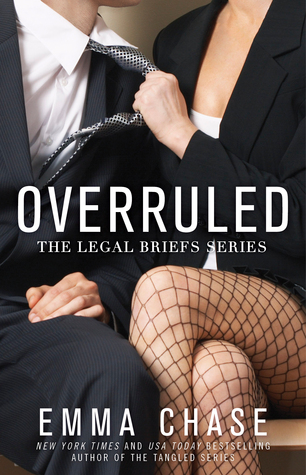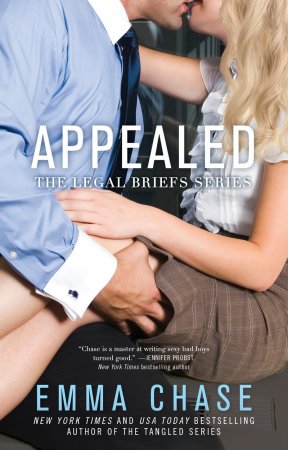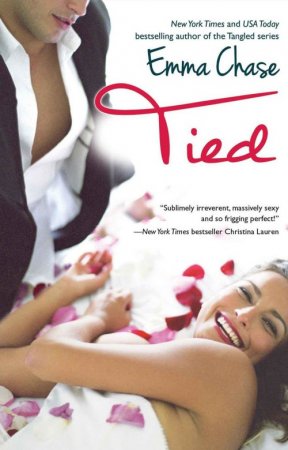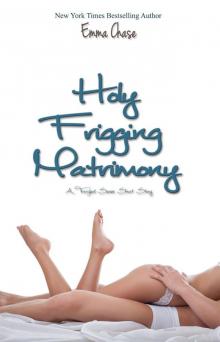- Home
- Emma Chase
Royally Yours Page 4
Royally Yours Read online
Page 4
If a praying mantis and a human had a baby, the result would be Oscar Pennygrove. He’s a tall, emaciated man with strangely long fingers that give the impression of two spiders attached to the ends of his arms. He’s the Home Secretary—an official witness to assure the country and Crown that there is no trickery or foul play at the births and deaths of any royal in the line of succession. He was in the room when I was born, and he was at Miriam’s birth too. He was present at the births and deaths of the siblings before me, and he stands silent in the corner now, like one of those portraits whose eerie eyes move when you do.
I put my hand on top of Father’s.
“It’s Lenora, Father. I’m here.”
Slowly, his eyes open and a moist rattling sound comes from his chest. His lips are blue-tinged and chapped, but they smile at me.
“Lenora.” His voice is reedy, so thin I lean forward to hear him. “I love you, my dear girl.”
You do?
It’s the first thought that springs into my head, and though I don’t say the words out loud, he reads them on my face and his fragile smile falters.
“You didn’t know. I should have done better by you. There was so much to teach you . . . but I should have done better.”
I take his hand in both of mine, holding it gently and close. Because I see it now—I understand. This man may have not given me everything I wanted—tickles and cuddles, laughter and pushes on the swing—but he spent his life giving me everything I will need.
And I won’t let him die thinking he failed me.
“No, Father. No . . .” My throat constricts. “You did wonderfully by me, I promise. I’ll make you proud. I’ll serve Wessco with dignity and honor, and I’ll make you so proud of me.”
He squeezes my hand back.
And though his breathing is ragged, he tells me, “I have always been proud of you. Do not serve . . . Lenora. Reign. With an iron grip . . . and a velvet touch. Trust . . . only . . . yourself. And reign.”
I nod, and though my eyes are full, I don’t let any tears fall. I hold them back, for him. To prove that even now, especially now . . . I can be strong.
His eyes close, and for many minutes the only sounds in the room are the beeping machine and Father’s frail breaths.
Alexander Bumblewood steps up beside me. “Would you like to return to the antechamber to wait, Princess Lenora? They’re having tea.”
Of course they are. Because tea fixes everything.
“No. I’ll stay with him.”
Kings are men . . . they die like any other man.
And this one will not die alone.
I get to my feet, lean over and kiss Father’s rough, leathery cheek. For the very first time, and the last. Then I sit back down, hold his hand, and in my head . . . I talk to him—telling him all the things I can’t say in front of the doctor and Prime Minister and Pennygrove.
I tell him about Thomas and the trouble we’ve gotten up to through the years. I tell him about my hopes and dreams for Wessco—ideas I didn’t share before, because I wasn’t sure if he’d approve. I tell him about me—a side he’s never seen that can be silly and wild. I tell him how desperately hard it is sometimes to be me—how awfully lonely—and then how stupid I feel for feeling that way, because I know I’m the most fortunate girl in the whole world. I say how grateful I am for all he’s given me—his support and attention and guidance.
I say . . . goodbye.
And still, none of it feels real. It doesn’t seem like he’s gone.
Not when the monitor stops beeping, or when the doctor checks for breathing and a pulse, and finds neither. Not when the time is announced or the sheet is drawn up or when the Home Secretary tells the Prime Minister to formally certify that His Most Royal King Reginald William Constantine II has passed from this life.
“Your Majesty . . .”
I don’t look up; I don’t move.
“Your Majesty . . .” Oscar Pennygrove says again.
And it’s only then that I realize he’s speaking to me. There can be several royal highnesses in a bloodline, but there is only ever one ruling majesty at a time.
Pennygrove offers me his bony hand. I take it as I stand and the bedroom door is opened, and I step into the room full of waiting, watching aristocrats—their eyes fixed on me.
Pennygrove’s proclamation is crisp and definitive.
“The King is dead. Long live the Queen.”
Like their ancestors before them, the lords reply in one resounding voice.
“Long live Queen Lenora!”
And that’s the moment. The moment the fog clears and the circumstances of who I am—what I am—becomes as real as real can be.
Queen Lenora.
Ready or not . . . here comes the crown.
Two months later
St. George’s Cathedral
The day of my coronation is bitterly cold—long, shining icicles hang from every corner of the palace and breaths come in exhales of puffy white bursts. My gown is a masterpiece of ivory satin, long in the back, cinched at the waist, with the Rose of Wessco intricately embroidered in silver filigree across the skirt. My lips are ruby red, my lashes sooty black. Glistening diamonds—my mother’s—dangle from my earlobes and the coronation robe rests on my shoulders, stretching out behind me in yards of pristine white fur.
It makes me feel like a mythical arctic huntress . . . a Winter Queen. A ruler of snow and ice.
When I emerge from the carriage—the same one my father rode in, and his father before him—in the shadow of St. George’s Cathedral, the camera flashes go off like fireworks and the endless crowd gathered along the streets roars. I hear them, but I don’t look their way. With my head held high, I ascend the stone steps, focused on the sacred ceremony before me. There will be massive celebrations—a coronation is a joyous event—but they will come later.
I stand in the atrium, alone, surrounded by only the vivid prisms of color shining from the stained-glass windows. The double doors open, and the members of the packed congregation rise to their feet, as the drums begin to pound out a deep imperial rhythm.
It’s the same beat that was played when royals were marched to the chopping block.
My ancestors enjoyed irony.
While I stand in the doorway, I experience a moment of terror, when it feels like my knees have disappeared. The faces of the lords and ladies all bedazzled in their best formal-wear seem to morph into some dark goblin nightmare—their eyes demon-black and their teeth-baring grins sharp and menacing.
I close my eyes.
And my mother’s lilting voice whispers in my head.
Breathe, my darling. Just breathe.
My father’s voice joins hers—an echo of his final command.
Reign.
And my knees return, solid and sure. Because I was raised for this.
Born for this.
I take my first step down the aisle, shoulders back, spine straight. In my periphery, I spot Thomas and Alfie and Miriam—and I know they are there for me, that they have my back. But it’s only now that I realize no one will ever be there to guard my front again. To shield me, to step before me.
I will always be first and on my own—for the rest of my life.
I reach the altar, where the Archbishop waits. I step up to the throne, turn to face the congregation, and the ceremony begins. The Archbishop anoints me with oil and says all the magic Latin words. I recite my oath, my solemn vow. The Lord Chamberlain invests me with the golden scepter and jeweled orb, and the Lord Chancellor slides the ring on my right hand.
And then I take my place upon the throne.
Saint Michael’s Crown—the jeweled and velvet glory of the Crown Jewels of Wessco—is brought forward by the Dean of Ansaline. The Archbishop prays, then slowly, reverently, he places the crown on my head.
And I wait for the transformation from Princess to Queen. The surging inner shifting that I’m sure must occur as one rises to the level of most royal sovereign.
Then, after a few moments, I blink.
Because it doesn’t happen. Nothing happens.
I don’t feel different. I still feel like me, only . . . me with a big crown on my head.
How anticlimactic.
Stealthily, I glance at the bishops and the crowd filling the cathedral pews. No one else seems to notice.
So, I carry on.
Regally, I walk back down the aisle, and every head bows before me. Outside the cathedral there are more flashes and cheers as I wave, then descend the steps and return to the carriage that carries me back through the palace gates. For the next hour, I’m greeted and congratulated by all government officiants and visiting dignitaries. I smile and nod and say the right things—but still it feels all so disappointingly make-believe.
Like pageantry. Like I’m a little girl, wearing her daddy’s crown, which is too big for her head.
And then it’s time to step out onto the balcony—the press loves this bit.
As I proceed alone, a frigid breeze wafts over me, tickling my skin with icy fingers. I rest my hands on the stone balustrade . . . and look down.
There’s an ocean of faces, men and woman and children—and they’re all smiling, cheering, waving and clapping. Tens of thousands of them—maybe millions. Some have tears running down their faces, but all have a look of complete adoration.
For me.
They’re here for me.
I’ve seen crowds before, my whole life. I’ve met the public—but not like this, never like this.
These are my people. And for the first time, I understand what that means.
Because I don’t just see them—I feel them. Their energy envelops me in its warm embrace. Their joy, their trust, their love . . . their acceptance. I feel it from the top of my head to the tips of my toes. My soul sings with it.
This is what it must be like to fall in love for the first time—this flying, breathless sensation. Or, how it must be to hold your own child and know instantly you will love him or her forever. You’ll do anything to keep your children safe, to do right by them, to give them the best life they can possibly have.
Slowly, glittering fluffy snowflakes drift down from the sky. Everywhere and all around.
It’s magical. Like a blessing.
I wave to the people. “Thank you! Yes, hello! Thank you!”
They can’t hear me, but I want them to know that I hear them. I see them. I care for them as they care for me . . . and I will never, ever let them down.
It’s only when my vision goes blurry that I realize I’m crying. Crying with joy and relief, overwhelmed by so much feeling. And still I wave. I wave until my arm aches—but it’s not enough.
With my heart galloping, I walk back inside.
“I want to go down. I want to speak to them, shake their hands, be among them.”
A dozen ancient disapproving faces look back at me.
The Lord Chamberlain steps forward, clearing his throat.
“Your Majesty . . . it’s not done.”
A government is a machine with many moving parts. The Crown is the key—but Parliament, the Advising Council, the Lords and Secretaries of State, they’re the gears. It’s a balancing act, a constant grinding tug-of-war—because the one who controls the key controls everything.
“You mean, it hasn’t been done before, not that it can’t be.”
“It’s not safe,” he insists.
I scan the room, and I spot my very own dark-haired guardian angel.
“Winston,” I call, using my commanding voice. “I wish to go down to see the people. Can you help me do that?”
He dips his chin and gives the Lord Chamberlain a piss-off sort of look.
“If that is what Your Majesty wishes, then that is what will be done. My men and I will keep you safe.”
I turn to the Lord Chamberlain and smile sweetly.
“See now, it’s no problem at’all.”
I walk through them, and Winston and his men close in around me, as I go down the stairs and out of the palace gates to let the people meet their new Queen.
And this crown feels like it fits just right after all.
THE AVERAGE PERSON WASTES a third of her life sleeping. My great-aunt Matilda told me that—she was a bouncy, wiry woman who drank too much black tea and rushed about like she was perpetually late for some important event that didn’t exist. I’ve never been much of a sleeper—three or four hours a night is more than enough.
Insomnia is a mark of genius. And insanity.
I tend to ignore that latter part.
On the third day after my coronation, I rise especially early—before sunrise. I dress in a kelly-green sweater and matching pencil skirt—with white gloves, my grandmama’s pearl broach and my hair twisted high into its usual bun. It’s a stylish look, but professional, and today, I’m all business.
A bit later, after a light breakfast and reading all three of the major newspapers, I pull up in the Rolls-Royce to the curb of Barrister’s department store. Nearly half of my face is covered by big, round sunglasses despite the drizzling rain, and I tip my head back and gaze at the mammoth stone building. Over the years, Alfie Barrister has built quite an empire. He has five stores now in cities across the world—with a sixth opening soon in Hong Kong.
My security team precedes me through the gleaming glass doors, across the shiny black-and-white-tiled floor, to the elevator up to the top, where I’ll find a jolly, redheaded man—who’s just the bloke I need to see.
“Hello, Chicken.” Alfie stands and bows from behind his giant mahogany desk. It’s a desk fit for a queen, and I make a mental note to commission a new one for myself straight away.
“Alfie.”
“Tea, Your Majesty?” Jones, Alfie’s secretary, asks.
“No, I’m fine.” I wave my hand. “You may leave us.”
“This is a pleasant surprise.” After I take one of the cushioned chairs across his desk, Alfie sits in the large leather one behind it. “Have you come by before we open to shop?” He winks. “I can get you a discount.”
“No shopping today. But I do have a request—a big one.”
“Request away. You know I could never tell you no.” He brings his china teacup to his lips.
And I drop the proverbial bomb. “I want you on the Advising Council.”
Alfie chokes on his tea.
“The Advising Council?” He dabs his mouth with a napkin. “That’s . . . unexpected.”
It’s unheard of, actually, but that’s just semantics.
“It’s a full-time commitment, Lenora. I don’t have room in my schedule.”
“Make the room. I need you, Alfie.”
Father said to trust only myself, and I do. I trust myself enough to know that I need men around me I can depend on.
“You once told Father the whole world is an advertisement and we’re all customers. Do you remember?”
That looks comes over his face, the same one he always gets when we talk about my father—warm and affectionate and still a little sad.
“I remember.”
“I need your business sense and marketing skill, Alfie. Father used to say if you have the people on your side, you have everything. I need you to make sure my message, my vision for the country, makes its way to the people.”
Alfie folds his hands across his belly, tapping his thumbs.
“You think Parliament will work against your vision?”
“I don’t know what Parliament will do. I must be prepared for anything.”
“Only nobility can serve on the Advising Council,” he points out.
Alfie had the ear, the confidence and the friendship of a king. But he wasn’t an aristocrat. Until now.
I hand him a large, sealed envelope—with a thick, folded sheet of paper inside that’s inscribed with black elegant writing, my signature, and stamped with the golden seal of the Crown.
“You are now the esteemed Earl of Ellin
gton. Congratulations.”
Alfie takes the envelope like it may bite him.
“Can you do that without Parliament’s approval?”
I shrug. “The land is mine, the titles are mine—I can hand them out any damn way I please. If you’d like an official ceremony, I can organize one for you.”
“That won’t be necessary.”
I watch his face and can practically see the wheels turning in his big, brilliant red head. Being a wealthy international businessman is all fine and good, but being a titled aristocrat is a whole other level of success.
Of stature.
So, I make my other request.
“I also need Cora to come work for me, as my private secretary.”
Alfie’s eyebrows lift high and mighty. “You’re commandeering my schedule and my only daughter?”
When Alfie’s children finished their schooling in Scotland, all three came to live in Wessco and work with him in the family business.
“You only have yourself to blame,” I tell him. “You’re always going on about her organizational skills, her energy and initiative. I could use some of that at the palace.”
Traditionally, the king’s private secretary has been a man’s position, but I think it’s time a lady filled the role. And Cora Barrister, with her father’s business sense and jovial personality, is just the woman for the job.
When Alfie continues to hesitate, I tease him.
“Don’t make such a fuss, old man. You still have Albert and Louis—they’ll continue the expansion of your great retail empire.”
“When did you start calling me Old Man?” He frowns.
“When you were still calling me Chicken after I was old enough to begin wearing a bra.”
That gets a chuckle out of him.
“So what do you say? Are you with me?”
And he smiles—the same warm, reassuring smile he’s given me my whole life.
“Of course I’m with you. Did you have any doubt?”
No, but it’s still nice to hear him say it.
I stand. “Welcome to the peerage, Alfie. Brace yourself—it’s not as much fun as it looks.”

 Overruled
Overruled Appealed
Appealed Twisted
Twisted Tied
Tied Royally Screwed
Royally Screwed It's a Wonderful Tangled Christmas Carol
It's a Wonderful Tangled Christmas Carol Tangled
Tangled Tamed
Tamed Sidebarred
Sidebarred Sustained
Sustained Tangled Extra Scenes
Tangled Extra Scenes Holy Frigging Matrimony: A Tangled Series Short Story
Holy Frigging Matrimony: A Tangled Series Short Story Getting Schooled
Getting Schooled Royally Matched
Royally Matched Royally Endowed
Royally Endowed Royally Raised
Royally Raised Dirty Charmer
Dirty Charmer Getting Played (Getting Some Book 2)
Getting Played (Getting Some Book 2) Royally Yours
Royally Yours